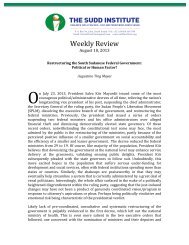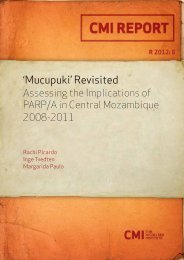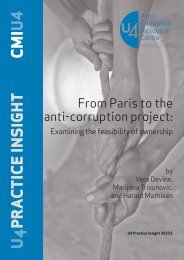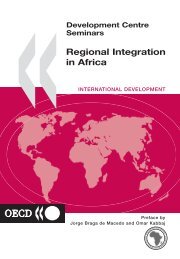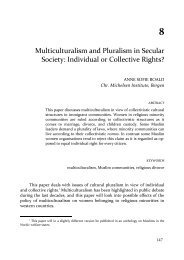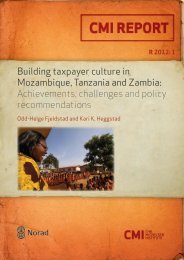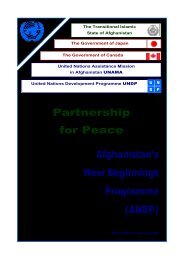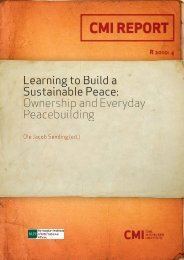Download (pdf) - CMI
Download (pdf) - CMI
Download (pdf) - CMI
Create successful ePaper yourself
Turn your PDF publications into a flip-book with our unique Google optimized e-Paper software.
<strong>CMI</strong> REPORT DECENTRALISATION AND GENDER R 2008: 9<br />
"Earlier, NGOs were not cooperative; they were very secretive and not transparent. They<br />
applied to donors for funding and received funding – without informing the local<br />
governments or sending the reports to the local government. Then, it was impossible to<br />
coordinate the NGO plans with LG plans. This has now started to change, the NGOs are<br />
starting to see themselves as development partners and the local government is now doing<br />
an inventory of the NGOs, to know who is doing what. For HIV-AIDS funds, there is a<br />
compulsory coordination as funds are allocated to the Local Governments, and then<br />
distributed from the local governments to the NGOs."<br />
According to other staff members, there is still room for improvement:<br />
"We are supposed to get the plans of the NGOs and integrate them in the local government<br />
plan, but very often we do not receive them. I personally think it is because the NGOs don't<br />
want us to find out who is funding them and how much they are receiving".<br />
Relationship with the private sector<br />
The DED underlined that the district is aware of the need for closer cooperation with the private<br />
sector and that they have received letters from PMO-RALG regarding this:<br />
"Within the few months I have been in Moshi as a DED there has been two joint meeting<br />
with NGOs, CBOs and private sector, one regarding tree planting, one regarding<br />
HIV/AIDS. I have only experienced one such joint meeting with NGOs and private sector<br />
during all the 16 years I have been an agricultural officer in other districts; that was re.<br />
agricultural input, seeds, machines and fertilizers.<br />
The Moshi community contributions also attract private funding for community initiatives. An<br />
example was given by a female councillor:<br />
"After the people had voted for me, I went back to them and said thank you very much. I<br />
also asked them how we women should develop. We agreed that we needed small business<br />
projects and decided to hold another meeting. We invited some business men in town as<br />
guests of honour and told them that we have collected money ourselves, but we have a gap<br />
compared to what we need. The businessman said “If you have tried your best, then we will<br />
top up.” Not all businessmen would have agreed, but we invited businessmen whom we<br />
know are kind hearted."<br />
While this cooperation between women’s income generating projects and businessmen is positive,<br />
one should bear in mind that contributing to women’s projects may also be a way for businessmen<br />
to advertise themselves – and in some cases even be the starting point of a political career. None of<br />
the interviewed people in Moshi mentioned private/community initiatives to improve maternal<br />
health.<br />
Relationship with religious institutions<br />
The team was told that cooperation between local government and the religious groups was very<br />
close:<br />
The council found that because 80% of the people go to church or mosque every week, and since<br />
religious leaders tend to be well respected, it would be a good idea to have religious leaders in the<br />
various Council Committees. In the Primary Health Care Committees of each ward there will be a<br />
religious leader. The government uses the religious leaders actively to spread information – because<br />
27



